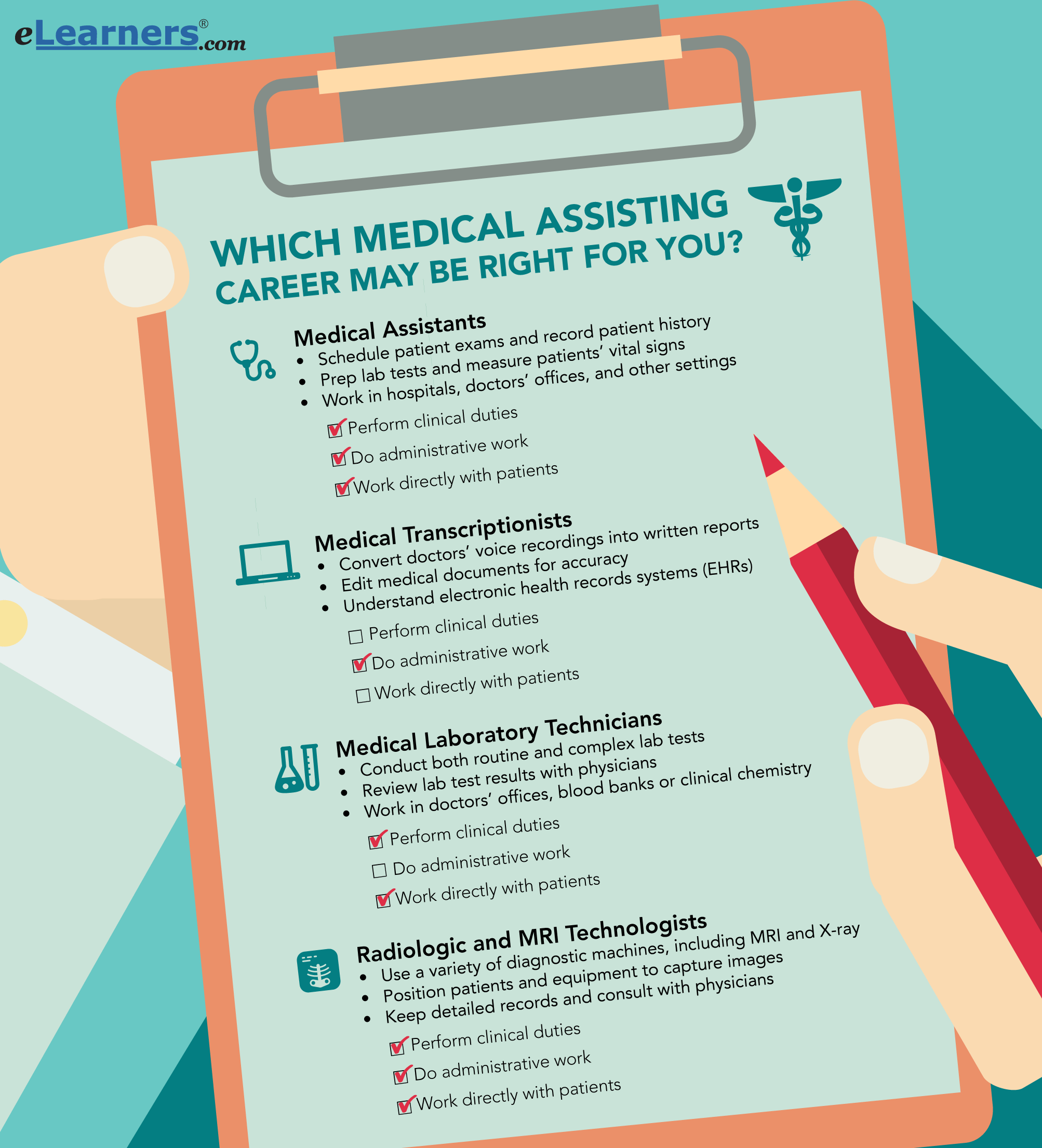You may not even think about Medical Assisting Careers, but when you go to the doctor, whether for a routine visit or because you are unwell, medical assistants are probably the first faces to greet you.
They are usually are part of a medical team that includes nurses, doctors, and medical administrative assistants and play an integral role in healthcare. While a medical administrative assistant performs primarily clerical duties such as manning the front desk, a medical assistant could participate in clinical tasks like helping with patient exams, drawing blood, and giving injections.
Additionally, they learn medical terminology and procedures as well as answer phones and file paperwork. With a degree in medical assisting, you may choose to pursue a career as a diagnostic medical sonographer, a medical transcriptionist, a medical administrative assistant, or in other varied careers.
Below are some possible medical assisting you could pursue after earning your degree.
 Medical Assistant
Medical Assistant
Medical Assistants have a variety of responsibilities and may be some of the busiest people in a doctor’s office.[i] Some Medical Assistants primarily perform administrative tasks like electronic records management, others may directly assist medical professionals with clinical tasks, and others may perform a mix of both kinds of duties. Whether scheduling a patient’s appointment or drawing blood for lab work, it is essential for these professionals to have a calm and friendly demeanor. An understanding of medical terminology, knowledge of medical billing and coding, and the ability to keep up in a fast-paced environment are also important. Medical Assistants typically work in hospitals or physicians’ offices, and employers typically prefer candidates who are certified.
Medical Office Manager
Medical Office Managers are responsible for running the office of a healthcare facility such as a hospital, medical center, or physician’s practice.[ii] They may be responsible for managing records pertaining to patients and the facility, directing office staff in carrying out administrative tasks, creating schedules, and ensuring that the practice runs smoothly. Medical Office Managers should be knowledgeable about medical terminology, billing and coding, and electronic records management. A high school diploma, related medical office experience, such as medical assisting, and proven leadership abilities may be enough to pursue this career track. In other cases, employers prefer candidates to hold a bachelor degree or certification.
Medical Secretary
Medical Secretaries play an important role in keeping a physician’s practice or healthcare facility running smoothly.[iii] These office professionals may perform tasks ranging from taking patient medical histories and transcribing reports to processing insurance payments and notifying patients of lab results. In addition to knowledge of administrative skills like typing and records keeping, medical secretaries should understand commonly-used medical terms, hospital and lab procedures, and other aspects of the healthcare field. While a high school degree is the minimum requirement for this career path, employers may prefer candidates with some postsecondary education or related experience in a medical office.
Medical Record Technician
Medical Record Technicians are essential members of a medical team, as they ensure the accuracy and accessibility of critical patient information.[iv] Medical Record Technicians may organize patient files, input and retrieve patient information electronically, assign medical codes to patient procedures for billing purposes, and perform other administrative tasks. They typically work in the offices of physicians’ practices, hospitals, and nursing care facilities. Knowledge of EHR (Electronic Health Records) software, patient privacy protocols, and best practices for secure records management are critical in this profession. Most employers prefer candidates with a postsecondary certificate or associate’s degree.
Medical Transcriptionist
If you ever heard your doctor dictate details about your examination during a visit, you can be sure that a Medical Transcriptionist transcribed that recording and turned it into a report for your patient file.[v] These professionals convert doctors’ recordings to text, prepare reports based on recorded notes, edit medical documents, and manage databases of reports. This challenging career usually requires good typing skills, a strong understanding of grammar and word-processing, and knowledge of medical terminology that may be encountered during transcription. Postsecondary preparation, such as an associate’s degree or certificate, is usually recommended or required for this occupation.
[i] bls.gov/ooh/healthcare/medical-assistants.htm#tab-1 [ii] bls.gov/ooh/management/administrative-services-managers.htm#tab-1 [iii] bls.gov/ooh/office-and-administrative-support/secretaries-and-administrative-assistants.htm [iv] bls.gov/ooh/healthcare/medical-records-and-health-information-technicians.htm [v] bls.gov/ooh/healthcare/medical-transcriptionists.htm
